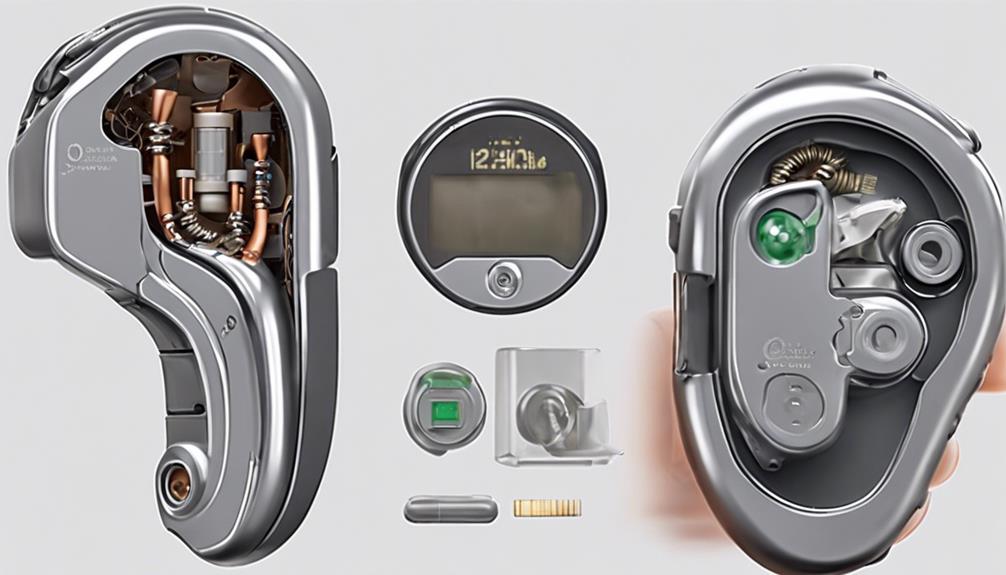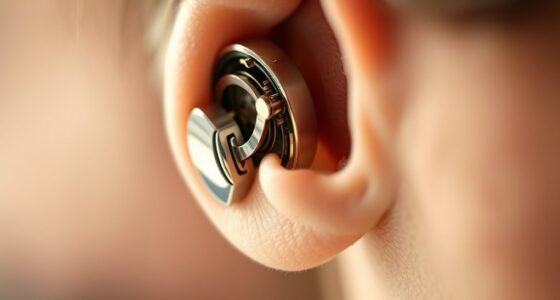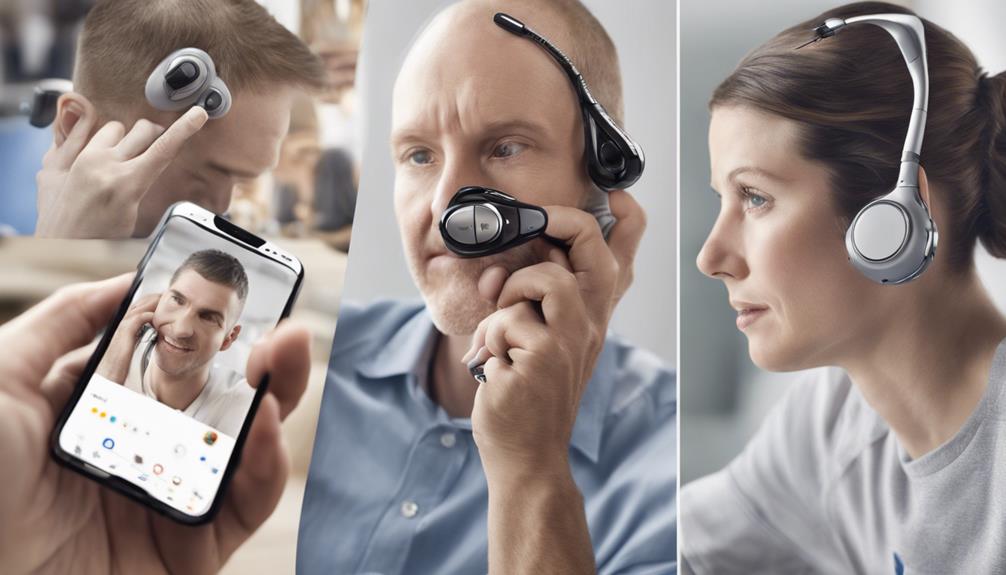Let’s explore the intricate connection between cochlear implants and the batteries that power them.
Have you ever wondered how these incredible devices manage to function seamlessly day in and day out? The complexities lie not only in the technology but also in the power source that keeps them humming along.
Understanding the nuances of battery usage in cochlear implants is crucial for optimal performance, but that's just the beginning of this fascinating journey into the world of auditory restoration.
Key Takeaways
- Cochlear implants require batteries for converting sounds into electrical signals.
- Battery options include rechargeable and disposable types, catering to user preferences.
- Batteries are essential for continuous power supply, enhancing communication and quality of life.
- Optimizing battery performance through proper storage and maintenance is crucial for uninterrupted implant functionality.
How Cochlear Implants Work
Cochlear implants function by converting incoming sounds into electrical signals that directly stimulate the auditory nerve. The implant system comprises an external sound processor and an internal receiver-stimulator. The sound processor captures sounds from the environment, converts them into digital signals, and transmits these signals to the internal implant. Once received, the internal implant decodes these signals into electrical impulses that bypass damaged portions of the inner ear and directly stimulate the auditory nerve, enabling individuals with hearing loss to perceive sound.
When it comes to powering these intricate devices, cochlear implants typically rely on batteries. There are various battery options available for cochlear implants, including disposable batteries and rechargeable batteries. Disposable batteries are convenient but need frequent replacement, while rechargeable batteries offer a more sustainable and cost-effective solution in the long run. Choosing the right battery option depends on factors like convenience, budget, and environmental considerations.
Importance of Cochlear Implant Batteries

Effective functioning of cochlear implants heavily relies on the reliable and efficient performance of their power source. Cochlear implant batteries play a vital role in enabling individuals with hearing loss to hear and communicate effectively. Understanding the importance of these batteries is crucial for optimizing the user's experience.
Here are three key reasons why cochlear implant batteries are essential:
- Continuous Power Supply: Cochlear implant batteries provide a continuous power supply to the sound processor, ensuring uninterrupted assistance for the user throughout the day.
- Mobility and Flexibility: The choice between rechargeable and disposable batteries offers users the flexibility to adapt to their lifestyle and preferences, allowing them to stay mobile and independent.
- Enhanced Communication: By maintaining proper battery management practices such as charging routines and carrying spare batteries, users can ensure enhanced communication abilities and improved quality of life with their cochlear implants.
Types of Batteries for Cochlear Implants
The power source for cochlear implants, crucial for enabling individuals with hearing loss to communicate effectively, primarily consists of rechargeable or disposable batteries to operate the sound processor.
Rechargeable battery options typically provide 10-20 hours of usage per charge, with variability based on the specific model being used. On the other hand, disposable battery choices, such as two 675 power zinc air batteries, offer a longer average life span of around 35 hours.
Users have the flexibility to select between rechargeable batteries for daily convenience or disposable batteries for situations where power sources aren't readily available. Both types of batteries cater to different user needs and preferences, allowing for effective management of battery life for cochlear implants.
It's essential for users to consider their daily routines, accessibility to power sources, and personal preferences when deciding between rechargeable and disposable battery options for their cochlear implants.
Battery Life and Replacement

When considering battery life and replacement for cochlear implants, users must carefully evaluate their daily usage habits and individual preferences to ensure optimal performance. Understanding the differences between rechargeable and disposable battery options is crucial for selecting the most suitable solution for one's needs.
- Battery Longevity: Rechargeable batteries for the Cochlear Nucleus 8 Sound Processor typically offer 10-20 hours of usage, depending on the specific battery size. In contrast, disposable batteries like two 675 power zinc air batteries can power the sound processor for up to 35 hours.
- User's Daily Routine: Consider how often you use your cochlear implant throughout the day. Users with longer daily usage might prefer rechargeable batteries for convenience, while those with less frequent usage may opt for disposable batteries.
- Replacement Frequency: The frequency of battery replacement varies based on the type of battery used and individual usage patterns. Regularly monitoring battery life and having spare batteries on hand can help prevent interruptions in device functionality.
Tips for Optimizing Battery Performance
To enhance the longevity and efficiency of cochlear implant batteries, maintaining proper storage conditions and monitoring usage closely are essential practices.
It's advisable to keep spare batteries on hand to prevent disruptions in device functionality. Storing batteries in a cool, dry place when not in use helps maintain optimal performance. Regularly checking the expiration dates of batteries and replacing them as needed is crucial to prevent malfunctions.
Cleaning battery contacts with a dry cloth ensures a good connection, facilitating efficient power transfer. Using a battery tester can help monitor battery levels, allowing for timely replacements and avoiding unexpected power loss.
Frequently Asked Questions
Do Cochlear Implants Need Batteries?
Yes, cochlear implants do require batteries to operate. The sound processor, essential for hearing, is powered by these batteries.
Users have the choice between rechargeable or disposable options, with rechargeable batteries offering 10-20 hours and disposables up to 35 hours of usage.
Selecting the right battery type is crucial for meeting individual lifestyle and hearing needs. Proper battery management is key to ensuring a seamless experience with cochlear implants.
How Long Does It Take to Charge a Cochlear Implant Battery?
We discovered that charging a cochlear implant battery typically takes around 4 hours for both rechargeable and disposable options. This consistent charging time ensures a reliable duration of use for users.
It's fascinating how such a short time investment can provide hours of sound clarity. Understanding this aspect can empower users to plan their battery charging effectively for uninterrupted hearing aid use.
How Are Cochlear Implants Powered?
Cochlear implants are powered by batteries that stimulate the auditory nerve. These batteries can be either rechargeable or disposable, offering varying durations of use.
Rechargeable batteries typically last 10-20 hours, while disposable ones can provide up to 35 hours of power. The choice of battery impacts the convenience and maintenance of cochlear implant usage.
Proper battery care is crucial to ensure uninterrupted functioning of cochlear implants.
What Kind of Battery Is in the Cochlear Implant?
We rely on zinc air batteries, like the 675 power zinc air batteries, to keep our cochlear implants running smoothly. These batteries are tailor-made to offer a steady and dependable power source.
With zinc air technology, we enjoy long-lasting battery life, averaging around 35 hours. Inserting them securely into the implant is a breeze, and the tamper-resistant lock ensures they stay put during all our daily activities.
Conclusion
In conclusion, it's essential to choose the right batteries for your Cochlear Implant to ensure optimal performance. Whether opting for rechargeable convenience or disposable reliability, proper maintenance and charging habits are key to maximizing battery life.
Remember, 'a stitch in time saves nine' when it comes to caring for your batteries, as a little attention now can prevent bigger issues later on. Keep your batteries charged and ready for a seamless hearing experience.










